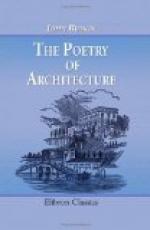OXFORD, Jan., 1838.
[Footnote 12: Herodotus viii, 137, freely quoted from memory. The story was that three brothers took service with a kinglet in Macedonia. The queen, who cooked their food herself, for it was in the good old times, noticed that the portion of Perdiccas, the youngest, always “rose” three times as large as any other. The king judged this to be an omen of the lad’s coming to fortune; and dismissed them. They demanded their wages. “When the king heard talk about wages—you must know the sun was shining into the house, down the chimney—he said (for God had hardened his heart) ‘There’s your wage; all you deserve and all you’ll get:’ and pointed to the sunshine. The elder brothers were dumfoundered when they heard that; but the lad, who happened to have his knife with him, said, ‘We accept, King, the gift.’ With his knife he made a scratch around the sunstreak on the floor, took the shine of it three times into the fold of his kirtle”—his pocket, we should say nowadays—“and went his way.” Eventually he became king of Macedonia, and ancestor of Alexander the Great.]
V.
A CHAPTER ON CHIMNEYS.
61. It appears from the passage in Herodotus, which we alluded to in the last paper, that there has been a time, even in the most civilized countries, when the king’s palace was entirely unfurnished with anything having the slightest pretension to the dignity of chimney tops; and the savory vapors which were wont to rise from the hospitable hearth, at which the queen or princess prepared the feast with the whitest of hands, escaped with indecorous facility through a simple hole in the flat roof. The dignity of smoke, however, is now better understood, and it is dismissed through Gothic pinnacles, and (as at Burleigh House) through Tuscan columns, with a most praiseworthy regard to its comfort and convenience. Let us consider if it is worth the trouble.
62. We advanced a position in the last paper, that silence is never perfect without motion. That is, unless something which might possibly produce sound is evident to the eye, the absence of sound is not surprising to the ear, and, therefore, not impressive. Let it be observed, for instance, how much the stillness of a summer’s evening is enhanced by the perception of the gliding and majestic motion of some calm river,




